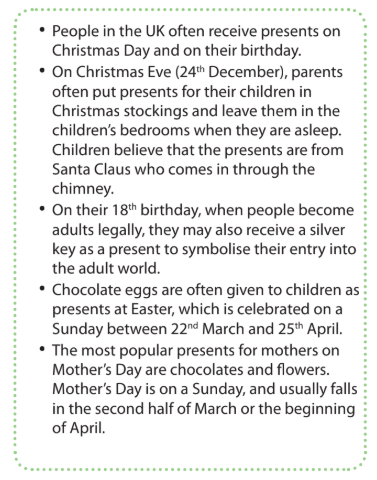Unit 7 lớp 10: Cultural Diversity - Communication and Culture
Bài học Unit 7 lớp 10 mới phần Communication and Culture giới thiệu cho các em bài viết để hiểu về việc tặng quà ở Anh và bài viết về ý kiến của người Mỹ và người Việt Nam về sự thành công. Qua đó các em nhận thấy sự giống nhau và khác nhau trong văn hóa của nước ta và hai đất nước này.
Mục lục nội dung

1. Communication
1.1. Task 1 Unit 7 lớp 10
Read some information about gift-giving in the UK. Read about each occasion and talk to a partner if you have a similar or different custom in Viet Nam. (Đọc vài thông tin về việc tặng quà ở Anh. Đọc về mỗi dịp và nói với bạn em nếu em có phong tục khác hoặc giống ở Việt Nam.)

Example 1:
Student A: I don’t get presents on Christmas Day, but I get lucky money on New Year’s Day.
Student B: Oh, really? I get presents on both Christmas Day and New Year’s Day.
Student A: Lucky you!
Example 2:
Student A: Do you give presents to your mother on Mother’s Day?
Student B: No, I don’t. But I give her flowers on Women’s Day.
Student A: I do, too.
Tạm dịch:
- Người Anh thường nhận quà vào Giáng sinh và sinh nhật của họ.
- Vào ngày trước Giáng sinh (24/12), cha mẹ thường đặt quà tặng cho con cái trong tất/vớ Giáng sinh của chúng và để chúng ở đầu giường của bọn trẻ khi chúng đi ngủ. Trẻ con tin rằng quà là từ ông già Noel mà đến tặng chúng thông qua ống khói.
- Vào ngày sinh nhật thứ 18, khi người ta chính thức trưởng thành, họ có thể nhận được một chìa khóa bạc như là món quà để biểu trưng cho hành trình họ bước vào thế giới người trưởng thành.
- Trứng sô-cô-la thường được tặng cho trẻ con vào ngày lễ Phục sinh, được tổ chức vào ngày Chủ nhật giữa 22 tháng 3 đến 25 tháng 4.
- Những món quà phổ biến nhất cho mẹ vào Ngày của Mẹ là sô-cô-la và hoa. Ngày của Mẹ vào ngày Chủ nhật và thường rơi vào nửa cuối tháng 3 hoặc đầu tháng 4.
Ví dụ 1:
A: Mình không nhận quà vào ngày Giáng sinh. Mình nhận tiền lì xì vào ngày đầu năm mới.
B: Ơ vậy à? Mình nhận được quà vào ngày Giáng sinh và cả năm mới.
A: Bạn may mắn quá!
Ví dụ 2:
A: Bạn có tặng quà cho mẹ vào Ngày của Mẹ không?
B: Không, nhưng tôi tặng hoa cho mẹ vào ngày Quốc tế Phụ nữ.
A: Mình cũng vậy.
1.2. Task 2 Unit 7 lớp 10
Put the following jumbled-up words and phrases to make questions about giving and receiving presents. Practise asking and answering the questions in pairs. (Đặt những từ và cụm từ bị xáo trộn để làm thành câu hỏi về việc tặng và nhận quà. Thực hành hỏi và trả lời câu hỏi theo cặp.)
1. for/who/presents/do/buy/you/often
2. presents/on/buy/what/do/you/occasions
3. shopping for presents/which shop/you’re/do you usually/when/go to
4. the most/present/expensive/what’s/you’ve/given
5. on/presents/what/receive/you/occasions/do
6. get/what/you/normally/do/presents
7. received/what/ever/is/the/you’ve/present/best
Guide to answer
1. Who do you often buy presents for? (Bạn thường mua quà cho ai?)
2. On what occasions do you buy presents? (Bạn mua quà vào những dịp nào?)
3. Which shop do you usually go to when you’re shopping for presents? (Cửa hàng nào bạn thường đi đến khi bạn mua quà?)
4. What’s the most expensive present you’ve given? (Bạn từng tặng món quà nào đắt tiền nhất?)
5. On what occasions do you receive presents? (Bạn nhận quà vào dịp nào?)
6. What presents do you normally get? (Bạn thường nhận quà gì?)
7. What is the best present you’ve ever received? (Món quà hay nhất mà hạn từng được nhận?)
2. Culture
Read the two texts about the American and the Vietnamese ideas of success and answer the questions. (Đọc hai bài văn về ý kiến của người Mỹ và người Việt Nam về sự thành công và trả lời những câu hỏi sau.)
Success for the Americans
The American idea of success has not changed much over the several centuries of its existence. First, success has always meant providing their family with a decent standard of living. Second, as for career development, success means ending their career in a higher and more prosperous position than when they began it. To an American, it is clear that success is the result of hard work and self-reliance.
Success for the Vietnamese
For many people, the idea of success varies greatly. However, the Vietnamese share some common views about personal success. First, success always goes along with a high-status job with good income. Second, being respected at work also means success. To a Vietnamese, a successful person is someone with high status and is supported by all people involved in his job.
Tạm dịch:
Thành công đối với người Mỹ
Ý kiến của người Mỹ về sự thành công không thay đổi nhiều qua hàng thế kỷ. Đầu tiên, thành công luôn có ý nghĩa là đem đến cho gia đình một tiêu chuẩn sống tốt. Thứ hai, về việc phát triển sự nghiệp, thành công có nghĩa là kết thúc sự nghiệp của họ ở vị trí cao hơn và thịnh vượng hơn khi họ bắt đầu. Với người Mỹ, rõ ràng là thành công là kết quả của việc chăm chỉ làm việc và tự tin tự lực.
Thành công với người Việt Nam
Đối với nhiều người, ý kiến về thành công khác nhau. Tuy nhiên, người Việt chia sẻ quan điểm chung về thành công cá nhân. Đầu tiên, thành công luôn đi cùng công việc, địa vị cao và thu nhập tốt. Thứ hai, thành công là được tôn trọng trong công việc. Là người Việt Nam, một người thành công là người có địa vị cao và được tất cả mọi người hỗ trợ trong công việc.
1. What is the American idea of success? (Quan điểm về thành công của người Mỹ là gì?)
2. Who can be considered a successful person in Viet Nam? (Ai là người có thể được coi là thành công ở VN)
3. What are the similarities / differences between the ideas of success in the two cultures? (Sự giống và khác nhau trong quan điểm của 2 quốc gia)
Guide to answer
1. For Americans, success means providing their family with a decent standard living, and ending their carecr in a higher and more prosperous position than when they began it. Success is also the result of hard work and self-reliance
(Đối với người Mỹ, thành công là đem đến cho gia đình một cuộc sống tốt và kết thúc sự nghiệp ở vị trí cao và đầy hứa hẹn hơn khi họ mới bắt đầu. thành công cũng là kết quả của việc chăm chỉ và không lệ thuộc)
2. For Vietnames, success goes along with a high-status job with good income and respect at work.
(Với người Việt Nam, thành công đi cùng với công việc, địa vị cao cùng thu nhập tốt và sự tôn trọng trong công việc.)
3. Both the Americans and Vietnamemse believe that success is earning a lot of money. Successful people in both cultures are expected to have high positions in their career. The Americans rely more on themselves, while the Vietnamese want to gain more respect from other people.
(Cả người Mỹ và Việt Nam đều tin rằng thành công là kiếm nhiều tiền. Người thành công ở cả hai văn hóa đều có địa vị cao trong công việc. Người Mỹ thì không lệ thuộc vàotrong khi người Việt Nam lại mong muốn nhận sự tôn trọng từ những người khác.)
3. Practice Task 1
Choose the letter A, B, C or D to complete the sentences with given words
Question 1: What/ the/ differences/ between/ traditional/ Vietnamese wedding/ modern/ one?
A. What is the differences between a traditional Vietnamese wedding and a modern one?
B. What are the differences between traditional Vietnamese wedding and modern one?
C. What are the differences between a traditional Vietnamese wedding for a modern one?
D. What are the differences between a traditional Vietnamese wedding and a modern one?
Question 2: The subways/ often/ crowded/ the morning/ when/ people/ rush/ work.
A. The subway are often crowded in the morning when people rush to work.
B. The subway are often crowded on the morning when people rush work.
C. The subway is often crowded on the morning when people rush to work.
D. The subway is often crowded in the morning when people rush work.
Question 3: Anna/ not/ have/ do homework/ today/ because/ tomorrow/ day off.
A. Anna doesn’t have to do homework today because tomorrow is a day off.
B. Anna doesn’t have do homework today because tomorrow is a day off.
C. Anna doesn’t have doing homework today because tomorrow is a day off.
D. Anna doesn’t have done homework today because tomorrow is a day off.
Question 4: When/ you/ come/ Brazil, you/ should/ tip/ the waiter/ 10%/ the bill.
A. When you come to Brazil, you should tip the waiter 10% on the bill.
B. When you come to Brazil, you should to tip the waiter 10% in the bill.
C. When you come to Brazil, you should tip the waiter 10% of the bill.
D. When you come to Brazil, you should to tip the waiter 10% of the bill.
Question 5: Australian/ not/ like/ be/ commented/ accents.
A. Australian doesn’t like being commented in accents.
B. Australian don’t like being commented in accents.
C. Australian don’t like to be commented on accents.
D. Australian doesn’t like to be commented on accents.
4. Practice Task 2
Choose the best answers to complete the sentences
Question 1: The English test was ....... than I thought it would be.
A. the easier B. more easy C. easiest D. easier
Question 2: English is thought to be ....... than Math.
A. harder B. the more hard C. hardest D. the hardest
Question 3: Jupiter is ....... planet in the solar system.
A. the biggest B. the bigger C. bigger D. biggest
Question 4: She runs ...... in my class.
A. the slowest B. the most slow C. the slowly D. the most slowly
Question 5: My house is ....... hers.
A. cheap than B. cheaper C. more cheap than D. cheaper than
Để nắm các từ vựng và các điểm ngữ pháp giúp việc giao tiếp đạt hiệu quả cao hơn, mời các em đến với phần trắc nghiệm Unit 7 Communication and Culture Tiếng Anh 10 mới sau đây và cùng luyện tập.
6. Conclusion
Kết thúc bài học, các em làm bài tập đầy đủ, đọc bài viết để hiểu về việc tặng quà ở Anh, nêu ra điểm giống và khác so với ở Việt Nam và đọc hiểu bài viết về ý kiến của người Mỹ và người Việt Nam về sự thành công và trả lời câu hỏi.
Tham khảo thêm
- doc Unit 7 lớp 10: Cultural Diversity - Getting Started
- doc Unit 7 lớp 10: Cultural Diversity - Language
- doc Unit 7 lớp 10: Cultural Diversity - Reading
- doc Unit 7 lớp 10: Cultural Diversity - Speaking
- doc Unit 7 lớp 10: Cultural Diversity - Listening
- doc Unit 7 lớp 10: Cultural Diversity - Writing
- doc Unit 7 lớp 10: Cultural Diversity - Looking Back
- doc Unit 7 lớp 10: Cultural Diversity - Project



